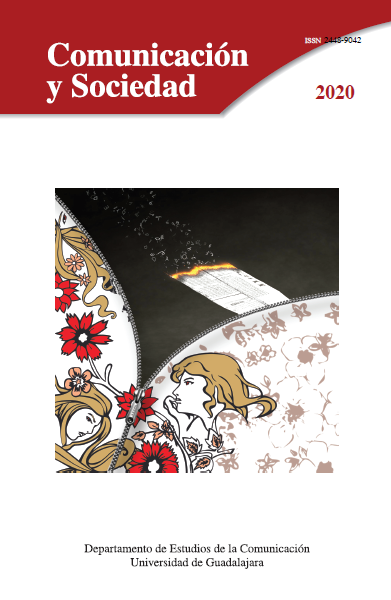Fanfiction como adaptación: el caso de El Fantasma de la Ópera
DOI:
https://doi.org/10.32870/cys.v2020.7561Palabras clave:
Fanfiction, El Fantasma de la Ópera, Fan studies, Adaptación, TranscreaciónResumen
Este artículo discute las fronteras teóricas que separan las adaptaciones de textos literarios (por escritores profesionales) y las actividades de los fans, especialmente las fanfictions de El Fantasma de la Ópera. El enfoque teórico trae consigo la noción de “transcreación” y autores del campo de fan studies. Los resultados incluyen el reconocimiento de las fanfictions como una forma de adaptación literaria y la noción de El Fantasma de la Ópera como archivo o como “literatura arcóntica”.Descargas
Citas
Bacon-Smith, C. (1992). Enterprising Women: Television Fandom and the Creation of Popular Myth. University of Pennsylvania Press.
Berger, R. (2012). Adaptation Nation: Medium Specificity in the UK. En M. Bahloul & C. Graham (Eds.), Lights! Camera! Action and the Brain: The Use of Film in Education (pp. 33-60). Cambridge Scholar Publishing.
Booth, P. (2010). Digital Fandom: new media studies. Peter Lang.
Campos, H. (2011). Da Transcriação: poética e semiótica da operação tradutora. Fale/UFMG.
Dahlberg-Dodd, H. E. (2019). The Author in the Postinternet Age: Fan works, authorial function, and the archive. Transformative Works and Cultures, 30. https://doi.org/10.3983/twc.2019.1408
Derecho, A. (2006). Archontic Literature. A Definition, A history, and Several theories of Fanfic. En K. Hellekson & K. Busse (Eds.), Fanfic and Fan Communities in the Age of the Internet (pp. 61-78). McFarland.
Fiske, J. (1992). The Cultural Economy of Fandom. En L. A. Lewis (Ed.), The Adoring Audience: Fan Culture and Popular Media (pp. 30-49). Routledge.
Gray, J., Sandvoss, C. & Harrington, C. L. (2007). (Eds.). Fandom: Identities and Communities in a Mediated World. New York University Press.
Gwenllian-Jones, S. & Pearson, R. (2004). Cult Television. University of Minnesota Press.
Hellekson, K. & Busse, K. (2014). The Fan Fiction Studies Reader. University of Iowa.
Hills, M. (2002). Fan Culture. Routledge.
Hills, M. (2010). Mainstream Cult. En S. Abbot (Ed.), The Cult TV Book: from Star Trek to Dexter, new approaches to TV outside the box (pp. 67-73). Soft Skull Press.
Jamison, A. (2017). Por que a fanfiction está dominando o mundo. Rocco.
Jenkins, H. (1992). Textual Poachers. Television Fans and Participatory Culture. Routledge.
Jenkins, H. (2009). Cultura da Convergência. Aleph.
Livingstone, S. (1990). Making Sense of Television: The Psychology of Audience Interpretation. Pergamon Press.
Massey, E. L. (2019). Borderland literature, female pleasure, and the slash fic phenomenon. Transformative Works and Cultures, 30. https://doi.org/10.3983/twc.2019.1390
Pearson, R. (2010). Fandom in the Digital Era. Popular Communication: The International Journal of Media and Culture, 8(1), 84-95. https://doi.org/10.1080/15405700903502346
Pugh, S. (2005). The Democratic Genre: Fanfic in a Literary Context. Seren.
Rush, A. (2018). The “Phan”-dom of the Opera: Gothic Fan Cultures and Intertextual Otherness. En K. Jones., B. Poore & R. Dean (Eds.), Contemporary Gothic Drama. Attraction, Consummation and Consumption on the Modern British Stage (pp. 139-158). Palgrave Macmillan.
Sandvoss, C. (2013). Quando estrutura e agência se encontram: os fãs e o poder. Ciberlegenda, 28, 8-41. https://periodicos.uff.br/ciberlegenda/article/view/36927
Stam, R. (2006). Teoria e Prática da Adaptação: da fidelidade à intertextualidade. Ilha do Desterro, 51, 19-53. https://doi.org/10.5007/2175-8026.2006n51p19
Descargas
Publicado
Versiones
- 2020-11-12 (3)
- 2020-11-11 (2)
- 2020-11-11 (1)
Cómo citar
Número
Sección
Licencia
Derechos de autor 2020 Clarice Greco, Maria Immacolata Vassallo de Lopes

Esta obra está bajo una licencia internacional Creative Commons Atribución-NoComercial 4.0.
Los autores/as que publiquen en esta revista aceptan las siguientes condiciones:
De acuerdo con la legislación de derechos de autor, los autores conservan los derechos de autoría y otorgan a Comunicación y Sociedad el derecho de primera comunicación pública de la obra. Comunicación y Sociedad no realiza cargos a los autores por enviar y procesar artículos para su publicación.
Los autores/as pueden realizar otros acuerdos contractuales independientes y adicionales para la distribución no exclusiva de la versión del artículo publicado en Comunicación y Sociedad (por ejemplo incluirlo en un repositorio institucional o publicarlo en un libro) siempre que indiquen claramente que el trabajo se publicó por primera vez en Comunicación y Sociedad.











